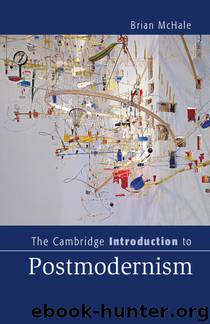Cambridge Introductions to Literature: The Cambridge Introduction to Postmodernism by McHale Brian

Author:McHale, Brian
Language: eng
Format: epub
Publisher: Cambridge University Press
Published: 2015-07-10T16:00:00+00:00
5. Prospero’s Books
The traditional and presumably “authorized” version of The Tempest – the one centered on Prospero, a benign patriarch and artist figure who uses magic to achieve reconciliation and restoration – has never disappeared; indeed, we have glimpsed several versions of that Prospero-centered play already. In the face of all the pressure from alternative, revisionist, against-the-grain Tempests, to persist in orienting one’s version around the traditional patriarchal Prospero seems like a retrograde gesture. Nevertheless, John Fowles does just that in The Magus (1966, 1977), despite adopting the point-of-view of the Ferdinand figure, and so does Iris Murdoch in The Sea, the Sea (1978), though she subjects her Prospero figure to irony, exposing him as a false magus and substituting a true one at the end of the novel.
Most egregious of all the unreconstructed Prospero-centered versions is Paul Mazursky’s 1982 film Tempest, in which Shakespeare’s play is updated as the story of a powerful male’s mid-life crisis. Phillip Dimitrius (played by John Cassavetes), a successful big-city architect (like Ballard’s Maitland), walks out on his career and his wife of many years, Antonia (Gena Rowlands), and, taking his teenage daughter Miranda with him, runs away to Greece, where he picks up a much younger drifter (Susan Sarandon) and settles on a barren island to live the good life. Reaffirming patriarchy and (neo)colonialism, Mazursky puts Miranda’s and Caliban’s plays in their place: Miranda (Molly Ringwald) is a cliché teenager, while the Greek islander Kalibanos (Raul Julia) is a comic Third-Worlder, sycophantic toward Americans and a scavenger of pop culture. It seems clear that director Mazursky himself identifies with the Prospero figure, as witness his casting of another film auteur, Cassavetes, as the architect Dimitrius (Zabus, 2002, 254–5).
But Prospero’s play need not be as retrograde as Fowles’s, Murdoch’s and Mazursky’s versions seem to be. A counter-example is Philadelphia Fire (1990) by the African-American novelist John Edgar Wideman, set in a troubled late-eighties Philadelphia, in the aftermath of the police massacre of the black separatist MOVE commune in 1985. A black Philadelphian, Cudjoe, returns from self-imposed exile on a Greek island to direct a production of The Tempest with a cast of West Philly schoolkids. Which Tempest version will this be? Maybe Caliban’s, given the fraught contemporary background of struggle and resistance; maybe Miranda’s, since the production showcases a preadolescent actress; but in any case Cudjoe’s – that is, Prospero’s.
As Cudjoe returns to Philadelphia to direct his play, so Prospero returns as artist figure and world-maker in postmodernist Tempests. However, postmodernist Prospero is not the traditional patriarch, and the world he makes is not a stable and centered one, but rather a provisional arrangement, flickering in and out of existence, subject to erasure. Indeed, this Prospero does not so much make his island-world as attempt to manage, not entirely successfully, the confrontations among a plurality of worlds (see Greene, 2000, 138–9). He is an author, no doubt, but his authority is only partial, just as his magic is only “partial magic” (see Borges, 1952).
Download
This site does not store any files on its server. We only index and link to content provided by other sites. Please contact the content providers to delete copyright contents if any and email us, we'll remove relevant links or contents immediately.
| African | Asian |
| Australian & Oceanian | Canadian |
| Caribbean & Latin American | European |
| Jewish | Middle Eastern |
| Russian | United States |
4 3 2 1: A Novel by Paul Auster(11033)
The handmaid's tale by Margaret Atwood(6836)
Giovanni's Room by James Baldwin(5870)
Big Magic: Creative Living Beyond Fear by Elizabeth Gilbert(4718)
Asking the Right Questions: A Guide to Critical Thinking by M. Neil Browne & Stuart M. Keeley(4566)
On Writing A Memoir of the Craft by Stephen King(4205)
Ego Is the Enemy by Ryan Holiday(3982)
Ken Follett - World without end by Ken Follett(3968)
The Body: A Guide for Occupants by Bill Bryson(3789)
Bluets by Maggie Nelson(3705)
Adulting by Kelly Williams Brown(3663)
Guilty Pleasures by Laurell K Hamilton(3578)
Eat That Frog! by Brian Tracy(3505)
White Noise - A Novel by Don DeLillo(3430)
The Poetry of Pablo Neruda by Pablo Neruda(3358)
Alive: The Story of the Andes Survivors by Piers Paul Read(3302)
The Bookshop by Penelope Fitzgerald(3220)
The Book of Joy by Dalai Lama(3212)
Fingerprints of the Gods by Graham Hancock(3206)
